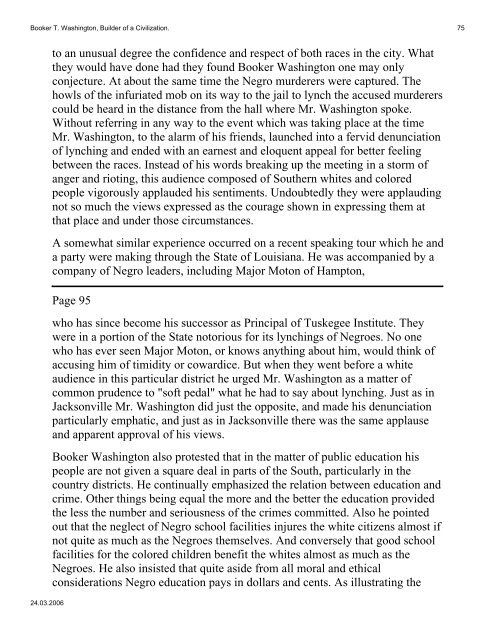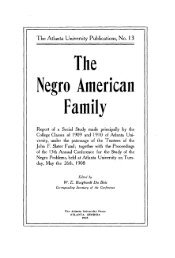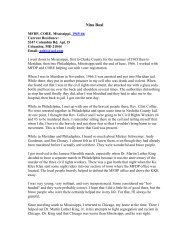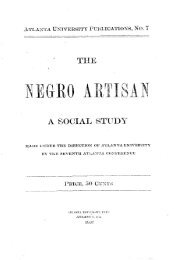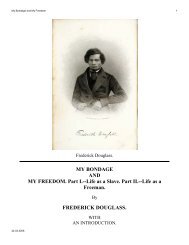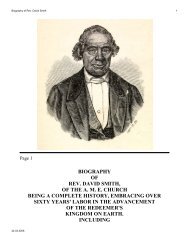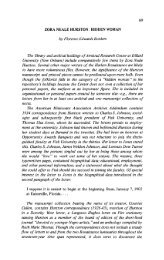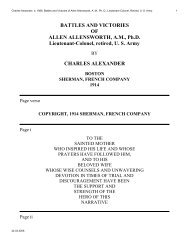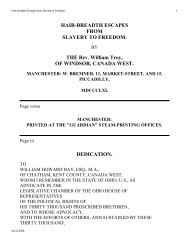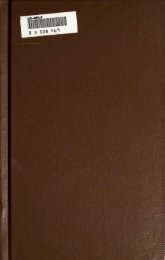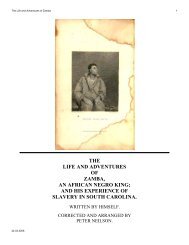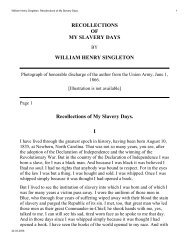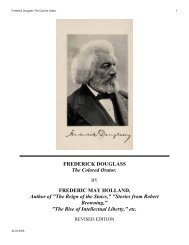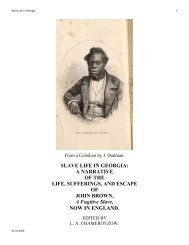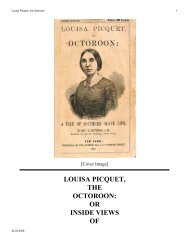Booker T. Washington, Builder o - African American History
Booker T. Washington, Builder o - African American History
Booker T. Washington, Builder o - African American History
You also want an ePaper? Increase the reach of your titles
YUMPU automatically turns print PDFs into web optimized ePapers that Google loves.
<strong>Booker</strong> T. <strong>Washington</strong>, <strong>Builder</strong> of a Civilization. 75<br />
24.03.2006<br />
to an unusual degree the confidence and respect of both races in the city. What<br />
they would have done had they found <strong>Booker</strong> <strong>Washington</strong> one may only<br />
conjecture. At about the same time the Negro murderers were captured. The<br />
howls of the infuriated mob on its way to the jail to lynch the accused murderers<br />
could be heard in the distance from the hall where Mr. <strong>Washington</strong> spoke.<br />
Without referring in any way to the event which was taking place at the time<br />
Mr. <strong>Washington</strong>, to the alarm of his friends, launched into a fervid denunciation<br />
of lynching and ended with an earnest and eloquent appeal for better feeling<br />
between the races. Instead of his words breaking up the meeting in a storm of<br />
anger and rioting, this audience composed of Southern whites and colored<br />
people vigorously applauded his sentiments. Undoubtedly they were applauding<br />
not so much the views expressed as the courage shown in expressing them at<br />
that place and under those circumstances.<br />
A somewhat similar experience occurred on a recent speaking tour which he and<br />
a party were making through the State of Louisiana. He was accompanied by a<br />
company of Negro leaders, including Major Moton of Hampton,<br />
Page 95<br />
who has since become his successor as Principal of Tuskegee Institute. They<br />
were in a portion of the State notorious for its lynchings of Negroes. No one<br />
who has ever seen Major Moton, or knows anything about him, would think of<br />
accusing him of timidity or cowardice. But when they went before a white<br />
audience in this particular district he urged Mr. <strong>Washington</strong> as a matter of<br />
common prudence to "soft pedal" what he had to say about lynching. Just as in<br />
Jacksonville Mr. <strong>Washington</strong> did just the opposite, and made his denunciation<br />
particularly emphatic, and just as in Jacksonville there was the same applause<br />
and apparent approval of his views.<br />
<strong>Booker</strong> <strong>Washington</strong> also protested that in the matter of public education his<br />
people are not given a square deal in parts of the South, particularly in the<br />
country districts. He continually emphasized the relation between education and<br />
crime. Other things being equal the more and the better the education provided<br />
the less the number and seriousness of the crimes committed. Also he pointed<br />
out that the neglect of Negro school facilities injures the white citizens almost if<br />
not quite as much as the Negroes themselves. And conversely that good school<br />
facilities for the colored children benefit the whites almost as much as the<br />
Negroes. He also insisted that quite aside from all moral and ethical<br />
considerations Negro education pays in dollars and cents. As illustrating the


